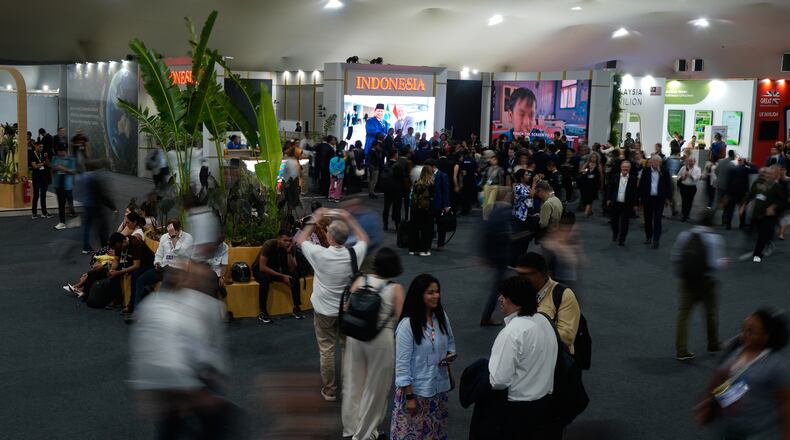The 195 nations who did come to Belem, a weathered city on the edge of the Brazilian Amazon, for the talks known as COP30 were told that only together can they swiftly reduce the emissions from coal, oil and gas that cause climate change.
While the activists’ empty chair primarily illustrated the U.S. absence, it was also intended to be a call-out for other nations “to step in and step up,” Danni Taaffe with Climate Action Network International told The Associated Press.
Those leading the talks sounded a similar note.
“Humanity is still in this fight. We have some tough opponents, no doubt, but we also have some heavyweights on our side. One is the brute power of the market forces as renewables get cheaper,” United Nations climate secretary Simon Stiell said.
A clear mandate
Brazil President Luiz Inácio Lula da Silva, whose nation is hosting these talks, urged negotiators not to forget that “the climate emergency is an increase of inequality."
"It deepens the perverse logic that defines who is worthy of living and who should die,” Lula said.
This year’s talks are not expected to produce an ambitious new deal. Instead, organizers and analysts frame this year’s conference as the “implementation COP.” Countries had a clear mandate: arrive with their updated national plans to fight climate change.
On Monday, the United Nations released updated calculations showing that those national pledges promise to reduce projected 2035 global greenhouse gas emissions 12% below 2019 levels. That's 2 points better than last month, before new pledges rolled in.
Attendees on Monday stressed cooperation, with Stiell saying that individual nations simply cannot cut heat-trapping gas emissions fast enough on their own.
André Corrêa do Lago, president of this year's conference, emphasized that negotiators must engage in “mutirão” — a local Indigenous term that refers to a group uniting to complete a task.
A united front — without the US
Complicating those calls is the absence of the United States, where U.S. President Donald Trump has long denied the existence of climate change.
The U.N.'s updated figures Monday depend on a U.S. pledge that came from the Biden administration in December — before Trump returned to the White House and began working to boost fossil fuels and block clean energy like wind and solar. His administration did not send high-level negotiators to Belem, and he began his second term by withdrawing for the second time from the 10-year-old Paris Agreement, the first global pact to fight climate change.
The Paris Agreement sought to limit warming to 1.5 degrees Celsius (2.7 degrees Fahrenheit) above the historical average, but many scientists now say it’s unlikely countries will stay below that threshold.
The United States has put more heat-trapping carbon dioxide into the air from the burning of coal, oil and natural gas than any other country. China is the No. 1 carbon polluter now, but because carbon dioxide stays in the air for at least a century, more of it was made in the U.S.
Palau Ambassador Ilana Seid, who chairs the Alliance of Small Island States, said the U.S. withdrawal "has really shifted the gravity'' of the negotiating system.
Trump's actions damage the fight against climate change, former U.S. Special Envoy for Climate Todd Stern said.
“It’s a good thing that they are not sending anyone. It wasn’t going to be constructive if they did," he said.
Though the U.S. government isn't showing up, some attendees including former top U.S. negotiators are pointing to U.S. cities, states and businesses that they said will help take up the slack.
‘A tragedy of the present’
Lula and Stiell said the 10-year-old Paris Agreement is working to a degree, but action needs to be accelerated. They pointed to devastation in the past few weeks including Hurricane Melissa in the Caribbean, typhoons smashing Vietnam and the Philippines and a tornado ripping through southern Brazil.
Scientists have said extreme weather events have become more frequent as Earth warms.
"Climate change is not a threat of the future. It is already a tragedy of the present time,’’ Lula said.
___
The Associated Press’ climate and environmental coverage receives financial support from multiple private foundations. AP is solely responsible for all content. Find AP’s standards for working with philanthropies, a list of supporters and funded coverage areas at AP.org.
___
This story was produced as part of the 2025 Climate Change Media Partnership, a journalism fellowship organized by Internews’ Earth Journalism Network and the Stanley Center for Peace and Security.
